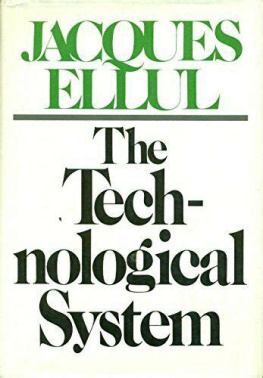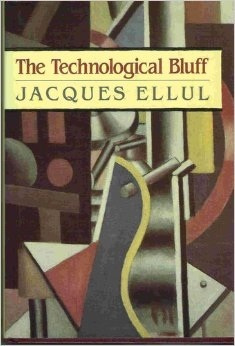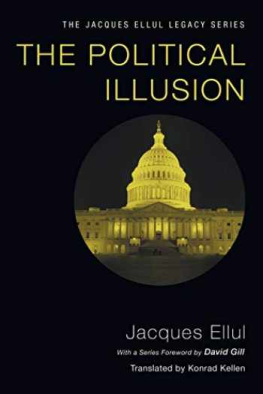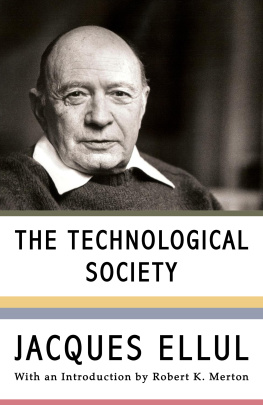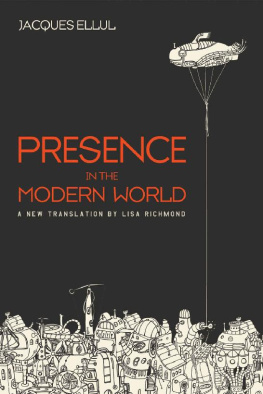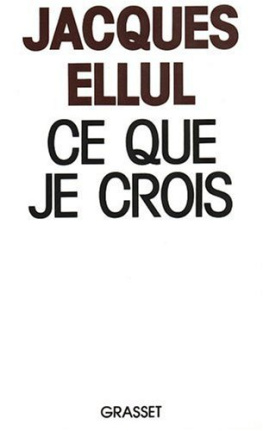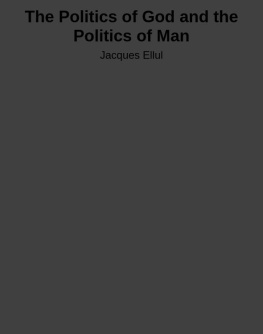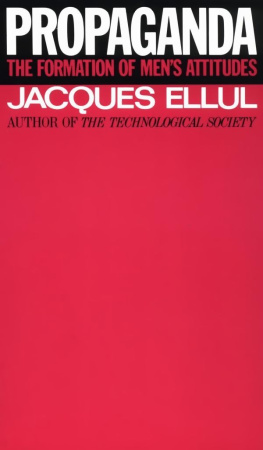PERSPECTIVES
ON OUR AGE
PERSPECTIVES ON OUR AGE
JACQUES ELLUL
SPEAKS ON HIS LIFE AND WORK
EDITED BY WILLEM H. VANDERBURG
REVISED EDITION

English translation copyright 1981 Canadian Broadcasting Corporation Preface to the first edition 1981 Willem H. Vanderburg Preface to the second edition and appendices 2004 Willem H. Vanderburg
All rights reserved. No part of this publication may be reproduced or transmitted in any form or by any means, electronic or mechanical, including photocopying, recording, or any information storage and retrieval system, without permission in writing from the publisher.
First published in 1981 by CBC Enterprises.
Published in 1997 by House of Anansi Press Ltd.
This edition published in 2004 by
House of Anansi Press Inc.
110 Spadina Avenue, Suite 801
Toronto, ON, M5V 2K4
Tel. 416-363-4343
Fax 416-363-1017
www.anansi.ca.
Distributed in Canada by
Publishers Group Canada
250A Carlton Street
Toronto, ON, M5A 2l1
Tel. 416-934-9900
Toll free order numbers:
Tel. 800-663-5714
Fax 800-565-3770
Distributed in the United States by
Independent Publishers Group
814 North Franklin Street
Chicago, IL 60610
Tel. 800-888-4741
Fax 312-337-5985
House of Anansi Press is committed to protecting our natural environment. As part of our efforts, this book is printed on Enviro paper: it contains 100% post-consumer recycled fibres, is acid-free, and is processed chlorine-free,
08 07 06 05 04 1 2 3 4 5
CBC logo used with permission
NATIONAL LIBRARY OF CANADA CATALOGUING IN PUBLICATION DATA
Ellul, Jacques
Perspectives on our age : Jacques Ellul speaks on his life and work
edited by Willem H. Vanderburg. Rev. and expanded ed.
Translated from the French.
ISBN 0-88784-697-1
1. Ellul, Jacques. 2. Intellectuals France Biography.
3. Technology and civilization. 4. Church and the world.
I. Vanderburg, Willem H. II. Title.
CT1018.E45A313 2003 944.081092 C2003-903129-2
Cover design: Bill Douglas at The Bang
Typesetting: Brian Panhuyzen

We acknowledge for their financial support of our publishing program the Canada Council for the Arts, the Ontario Arts Council, and the Government of Canada, through the Book Publishing Industry Development Program (BPIDP).
Printed and bound in Canada
Contents
Preface to the First Edition
WHILE DOING GRADUATE WORK in the applied sciences, I became increasingly struck by a strange contradiction between what we perceived the value of our research to be and the kind of world that emerged largely as a result of the application of this type of research. Countless highly specialized research efforts of the kind we were engaged in clearly led to advances in the means society uses for its existence. They helped to make things work better and more efficiently, and that could only be seen as good. Yet we were daily bombarded with information about the mixed blessings of science and technology. Obviously something unexpected happened as the results of countless highly specialized research efforts were woven together into new or improved means for our existence to become incorporated into the fabric of our civilization. But the training of researchers like myself did not prepare us to understand these processes, let alone anticipate or adjust for them in our work. The standard explanations to the effect that we only produced neutral means and that the problems arose because society applied them badly, did not at all satisfy me.
So I tried to find real answers by exploring the literature dealing with the way science and technology have affected past and present civilizations. I quickly discovered that much of this work was seriously lacking in a variety of ways. This can best be illustrated by using a simple analogy. If we wish to research the properties of water, we know better than to study only the properties of its basic components. The properties of water cannot be deduced from those of oxygen and hydrogen, because something new emerges when they combine. Under normal conditions, hydrogen and oxygen are gases, but water is a liquid with fundamentally different properties. We acknowledge this by saying that the whole is more than the sum of the parts. When it comes to the interactions between science and technology and the way they permeate society, producing new entities and structures, this is all too often forgotten.
It is frequently acknowledged that science and technology continually shape and reshape almost all aspects of contemporary society, but many disciplines pay very little attention to the roles they play. The high degree of specialization of these disciplines has not allowed them to see the massive new structures that have emerged. My search led me to the work of Jacques Ellul, who by means of his concept of technique has attempted to deal with some of these problems.
Throughout history human societies have created concepts to get at the meaning of the wholes in their experience. When in prehistory human existence was largely embedded in nature, people did not consider that this environment was simply a collection of constituents and phenomena that had no interrelationships apart from those that could be observed on the level of immediate experience. In other words, no group of people ever held that there were just rocks, trees, lakes, mountains, clouds, birds, and so on. Via science and religion, humanity has always asserted that this world has a nature and a structure.
While today we live in a largely artificial world, the situation is no different. We do not live on the level of immediate experience, and concepts such as the state, the economy, science, technology and industry have been created in order to make sense of our world. But many new phenomena have sprung up in the second half of this century, hence the question arises as to the adequacy of our stock of concepts for understanding reality. If these new phenomena indicate the emergence of new structures, new concepts may well be required to make sense of our world.
The creation of new concepts is a hazardous venture. If we go too far, we alienate ourselves by creating an ideology, while if we do not go far enough we barely go beyond immediate experience and fall short of understanding the forces and deep structures of our contemporary civilization. In either case, we will not be able to effectively cope with the challenges we face. We must therefore constandy put our theories and concepts to the test.
In creating the concept of technique, Jacques Ellul has made an important contribution toward understanding our age. In my opinion this concept may well become as central for understanding our times as the concept of capital became for the nineteenth century. Our world has emerged from what Ellul calls a technical intention, which is the preoccupation of our civilization with the one best way of doing things. It involves studying every human activity and utilizing the results to build some kind of model. By determining under which conditions the model functions optimally, one can proceed to restructure that activity to make it as efficient as possible.
The means to do so, in almost every area of modern society, Ellul has called techniques. These techniques are increasingly interdependent and have begun to constitute first a phenomenon, and later a system. Technique is clearly much broader than technology, which is only one of its branches. As it permeates contemporary societies, they are fundamentally changed, leading to an entirely new civilization. In his work, Ellul has examined many aspects of this civilization, showing us that our all-out attempts to render the means of our existence more efficient have produced something quite unexpected, of which other thinkers have seen only a part.
Next page

